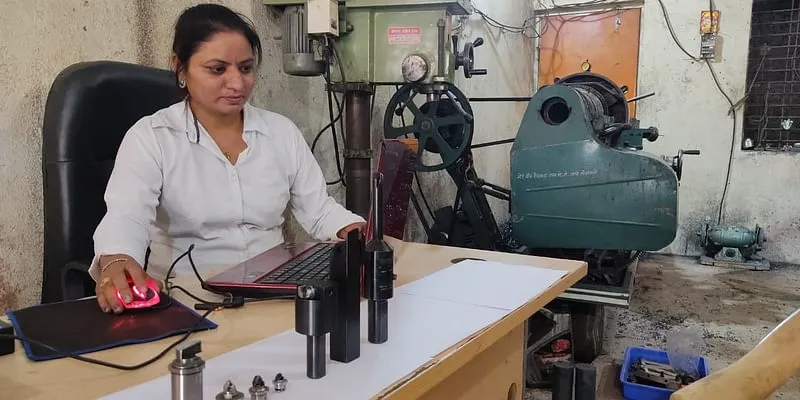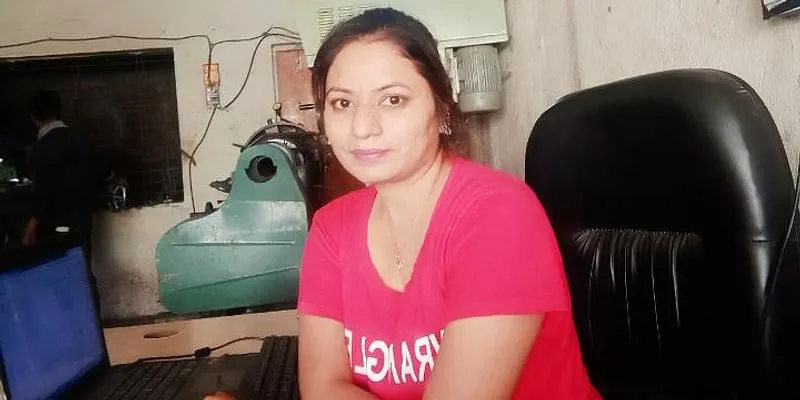This woman entrepreneur from Aurangabad gives heavy metal a whole new meaning while busting myths
Why you should read Rani Tulja’s story and why stories like her need to be celebrated.
Last week, while the business community and media were celebrating, and rightly so, the rise of women entrepreneurship in India on the occasion of Women Entrepreneurship Day, a 34-year-old frail woman stood resolutely under her dripping umbrella awaiting a bus.
A business owner herself, she was on her way to meet a potential customer. Tulja Sukhdayalsing Sharma aka Rani Tulja has a small workshop in Aurangabad under the name of Tulja Tooling in the machine tools business. For nearly two years now, she has been out on the road, come rain or shine, meeting industrialists and manufacturers to sell her products.
Her immediate goals are to set up her own website and start the process of digital marketing so that she can reach more customers, and buy a CNC machine to enable her to meet the increasing demand for her products.
Tough as a nail

Rani Tulja at her workshop in Aurangabad.
Before we move on with her story and tell you precisely why stories like Rani Tulja’s need to be told and celebrated, it will help us better to understand the business she is into.
Machine tooling business is a process of manufacturing components like fixtures, gauges, moulds, cutting equipment and patterns, and so on, which are required by all types of manufacturing industries like automobiles, heavy machinery, and so on. Goes without saying that poor tooling can greatly affect the health and pricing of machines used by big industries.
Aurangabad in Maharashtra, being an industrial hub, has large pockets of its industrial areas littered with small and big tooling manufacturers.
Being one of the few women who chose to set up her own tooling workshop rather than work in another establishment, soft-spoken Rani Tulja stands out in this macho landscape of machines and tools.
After completing her diploma in Draftman Mechanical from the town, Rani not only battled the prejudice that her gender attracts, but had to undergo severe personal challenges to the point where she even contemplated ending her life.
Yet, today, she stands tall.
She has not only found a firm footing in her area of expertise but has expanded the market of her products to neighbouring Kolhapur, Nagpur, and other states like Gujarat and Punjab.
“Yeh meri zid hai. Main kuch kar ke dikhaungi (I am adamant to succeed),” she tells SMBStory.
Hard thing about hard things
It is often assumed that women do not get into hardcore manufacturing business and that this space is not for them, that they are better off starting a tailoring or catering business instead. Rani, a single mother of a six-year-old son, has no time nor inclination to bust such myths.
When she acquired her diploma, she found employment in various small establishments earning Rs 1,500 as an apprentice honing her technical skills. While she was working at another establishment, an encounter with her superior left her feeling humiliated and she decided to “someday start my own business”.
Her opportunity came in 2017 when she started her own workshop with a borrowed machine and the assurance of mentorship from one of her senior colleagues. She was able to get a loan of Rs 10 lakh sanctioned by the bank under a government scheme.

Rani Tulja: made of sterner stuff.
However, her well-laid-out plans went awry because of domestic violence. Nearly four years passed where she lost control of her business, which she had set up with her own money, to her estranged husband.
“Mere liye woh bahut hi bura samay tha. Ab bhi hai, par ab main strong hun (those years were very tough for me. Times are still tough, but I am stronger for it),” she says recalling her struggles.
Rani restarted her business in 2020 during the pandemic with some money borrowed from her supportive parents and pawning her gold. Today, she has five machines, including a milling machine, lathe machine, and drill machine, and employs two workers. She does the design, technical work, and marketing herself, and made a modest sum of Rs 24 lakh last year.
For someone who believes in one step at a time, she has walked a great distance already.
Edited by Teja Lele








